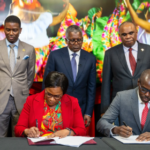Now Reading: Four CARICOM States to Launch Full Free Movement by October
-
01
Four CARICOM States to Launch Full Free Movement by October

Four CARICOM States to Launch Full Free Movement by October

In a significant milestone for Caribbean regional integration, four CARICOM member states; Barbados, Belize, Saint Vincent and the Grenadines, and Dominica, have confirmed that they will implement full free movement of CARICOM nationals by October 1, 2025.
The announcement came from Jamaica’s Prime Minister Andrew Holness, current Chairman of CARICOM, during the closing press briefing of the 49th Regular Meeting of the CARICOM Conference of Heads of Government, held in Montego Bay, Jamaica.
Holness explained:
“We agreed that the pace and scope of implementation was just too slow, and we will do everything in our power to speed up implementation.”
With this statement, he highlighted the leaders’ renewed commitment to deeper collaboration under the CARICOM Single Market and Economy (CSME).
What Is Free Movement?
Free movement within CARICOM refers to the unrestricted right of nationals to live, work, and travel within participating member states without work permits or lengthy immigration processes. Moreover, it is a cornerstone of the CARICOM Single Market and Economy (CSME), which seeks to create a single economic space that encourages the seamless movement of goods, services, people, and capital.
Under full free movement, eligible CARICOM nationals can:
- Reside and seek employment in another participating state
- Carry out entrepreneurial or self-employed activities
- Relocate with their dependents
- Access agreed social services
Consequently, this model mirrors similar principles found in regional unions like the European Union. As a result, it aims to stimulate economic growth, expand job opportunities, and strengthen regional unity.
A Step Toward Deeper Integration
The Protocol on Enhanced Cooperation, which supports advanced integration measures, has already been signed by all CARICOM states. However, implementation has remained uneven and slow. Therefore, the decision by Barbados, Belize, Saint Vincent and the Grenadines, and Dominica to launch full free movement by October marks a major shift in momentum.
Once the policy is in effect, nationals from any CARICOM country will be able to relocate to these four states with significantly fewer bureaucratic barriers. In turn, this will promote greater mobility, encourage cultural exchange, and enhance economic cooperation across the region.
What This Means for Caribbean Nationals
For students, professionals, entrepreneurs, and creatives across the Caribbean, the ability to freely relocate, seek jobs, or establish businesses in these states will open up exciting new possibilities. Furthermore, it could help address labour shortages, foster innovation, and reinforce a shared Caribbean identity.
Looking ahead, more CARICOM states are expected to adopt full free movement as regional leaders push to accelerate integration. With this renewed drive, the long-envisioned goal of a more connected, mobile, and empowered Caribbean community is moving closer to reality.




























